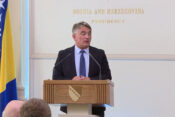
In terms of security, the deadlock in Bosnia over forming the government represents “one of the most dynamic and most sensitive situations” the country has found itself in after the war, professor at the Sarajevo Faculty of Criminalistics, Criminology and Security Studies, Jasmin Ahic, told N1 on Sunday.
“Such a situation, the blockage in the process of forming the government at the state level, prompts security institutions to consider how to resolve this ‘Gordian knot’,” he said.
Bosnia lacks a new Council of Ministers since the October 2018 election because the Bosniak and Croat members of the tripartite Presidency refuse to vote for the new Prime Minister, who is supposed to come from the ruling Bosnian Serb party, because his party opposes sending the Annual National Programme (ANP) to NATO – the next step on Bosnia’s path to becoming a member of the alliance.
Although they agreed to Bosnia’s NATO membership before and signed off on the country taking over obligations regarding potential membership, including sending the ANP to Brussels, Bosnian Serb political leaders now vehemently oppose any activities that may bring the country closer to becoming a full member.
The leaders of the three parties which won the election signed an Agreement containing principles for forming the government on August 5 in an effort to overcome the stalemate, but the main issue, the ANP, is vaguely defined in the document.
The central issue remains unresolved while the 30-day deadline set in the agreement is approaching.
“It is clear that the parties set their conditions which they do not want to back off from and then some threatened with blocking the institutions – which we have not seen in Bosnia and Herzegovina until now and which opens up the possibility for considering some scenarios which nobody wants to see,” he said.
But security institutions are doing their job, which is why there is no danger of the events that took place in North Macedonia or Montenegro in recent years happening in Bosnia, he said.
“One needs to have the organizational-technical means to do something like that,” he said, explaining that before the change in power in North Macedonia “there was a long protest in front of the Parliament Building” and that “in Montenegro, there was a subversive attempt of a coup.”
Ahic said he expects the situation over the ANP and NATO to be resolved soon as such a situation “can not last for long.”
Institutions such as the Intelligence-Security Agency of Bosnia and Herzegovina, the State Investigation and Protection Agency and others nevertheless need to be on the lookout daily, he stressed.
“The most important thing is that our institutions are up to the task and point out possible threats which could emerge if this political-security situation is not resolved soon,” he said.





